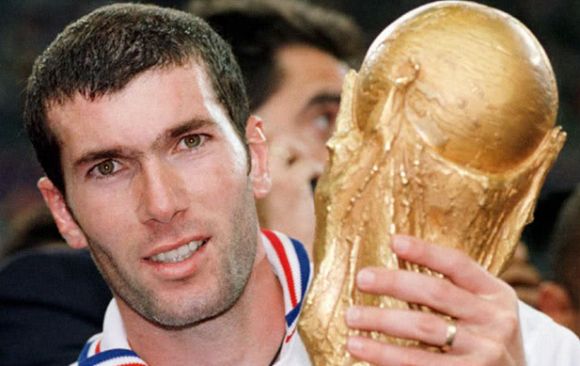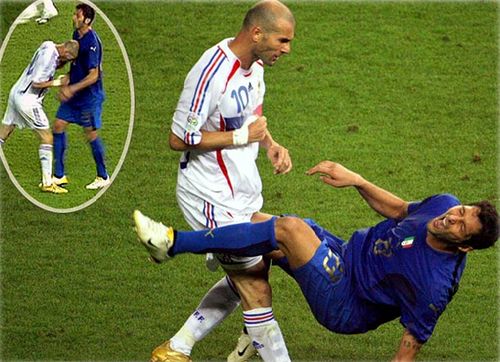
The greatest footballers of all time - No. 3
Continuing with our series on the greatest footballers of all time, here’s No. 3 on our list.
No. 3 – Zinedine Zidane

The stage was set. One of the game’s perennial chokers vs the game’s greatest side. Hosts vs defending champions. The stage was the final of the 1998 FIFA World Cup, which would be played at the Stade De France in Paris. Oh, and it involved two of the world’s best players.
Packed with mega stars, Brazil seemed set to swat hosts France aside in the match, with their talismanic striker Ronaldo in imperious form. Supported by the likes of Roberto Carlos, Dunga and Rivaldo, Ronaldo had led the defending champions to the final after a tense semi-final over the Netherlands. France, an underrated side, boasted the likes of Laurent Blanc, Marcel Desailly, and Ronaldo’s only equal, a shy, quiet and unassuming midfield maestro named Zinedine Zidane. The inspirational Blanc had been suspended for the final (he was red-carded in the semi), and Ronaldo was only half-fit, after having contracted a mysterious illness the day prior. It was expected to be a nervy affair.
What happened on the day mesmerized audiences the world over and cemented the legacy of France’s No. 10. Taking the fight to Brazil, Zidane was simply immense, bamboozling the dumbstruck Brazilians, and the French dominated their illustrious Samba rivals, reducing a half-fit Ronaldo to a mere spectator. Zidane, who scored two headers, ran rings around the Brazilians, who had no answer to his passing and movement.
Cesare Maldini, the manager of the Italian team at the 1998 FIFA World Cup, said: “I would give up five players to have ‘Zizou’ in my squad.”
Zidane was inevitably named Man of the Match, and became a cult hero in France.
The son of Algerian immigrants, Marseille’s most famous footballing son started his career at AS Cannes in 1988, making his first-team debut in 1989 against FC Nantes, at the tender age of 17. A rising star in France, Zidane’s potential was evident from his first touch. Never the fastest player, Zidane’s game focused more on controlling, receiving and spreading the ball out. He oozed natural class. After four moderately successful years with Cannes, Zidane was picked up by FC Bordeaux in 1992, helping them win the 1995 UEFA Interto Cup, and leading them to the final of the 1996 UEFA Cup.
Zidane truly rose to prominence with the Les Girondins, and was a hot commodity by 1995. Blackburn manager Kenny Dalglish made numerous attempts to sign Zizou, only to be rebuffed by owner Jack Walker.
Walker famously told Dalglish, “”Why do you want to sign Zidane when we have Tim Sherwood?”
Despite the infamous comment, Zidane took on the mantle of the French national team from the enigmatic Eric Cantona and led them to the semi-finals of Euro 1996, leading to a £3.2 million transfer to UEFA Champions League holders Juventus. Becoming a true behemoth in Turin, he led the club to several titles, earning the adulation of Turin. Not since the days of Zidane’s idol Michel Platini had Juventus and France seen a player with such natural ability who could tear apart world-class defences in a heart-beat. Zidane was immense for the Old Lady, leading them to successive Champions League finals in 1997 and 1998, although both ended in disappointment. During his time in Turin, Zidane undoubtedly became the world’s best player, winning the FIFA Player of The Year award in 1998 and 2000. He was as influential as ever in France’s Euro 2000 triumph, helping his country become only the second ever team to hold both trophies and cement their place in history as one of the all-time great teams in the process. And Zidane was the undisputed star of that legendary French squad.
When Real Madrid came calling with a world-record €75 million bid in 2001, Zidane became one of the first Galacticos. Madrid played some breath-taking football, assembling their team around the Frenchman, and won the league title in 2003. The highlight of Zidane’s Madrid career was his sumptuous volley with his weaker left foot in the 2002 UEFA Champions League final against Bayer Leverkusen, which went on to become one of the greatest and most iconic goals in football history, and the crowning moment of the Los Galacticos. It was also a personal triumph for him. He had finally won the Champions League.
Zidane’s manager at Juventus, Marcello Lippi, said this about the man: “I think Zidane is the greatest talent we’ve known in football these last 20 years, yet he never played the prima donna. I am honoured to have been his manager.”
He was the star of Madrid, and the biggest footballing icon of his generation. France struggled badly after his retirement in 2004, leading to Zidane coming out of retirement in 2005, and helped the French qualify for Germany 2006. He had already announced his retirement from all other forms of the game, and it was well-known that the World Cup would be his last tournament. Zidane belied his years, playing some of his best football ever, and was the architect of France’s victories over Spain, Brazil and Portugal, leading to the final showdown with Italy in Berlin.
During the course of an excellent performance against the Italians, the tournament’s best player was provoked by Marco Materazzi in extra-time, leading to the ‘head-butt seen around the world’ which led to France’s defeat and Zidane’s retirement.

It just wasn’t right. The greatest player of his generation didn’t deserve this. What an unfortunate way to go out. The image of Zidane head-butting Materazzi and walking out into the tunnel has become an infamous part of football’s undying legacy. But Zidane was too good. Just simply too brilliant. Not a mere mortal, the legacy that he had strived for 20 years to build survived, despite the infamous action.
Zizou was like wine, he just got better with age. There seemed to be no stopping him. If it wasn’t for the injuries in his final season at Madrid, he could’ve easily continued for at least another two years. Being the pivot of France, his importance was there for all to see, as the French suffered an ignominious defeat in the 2002 FIFA World Cup, which he missed. They have struggled since his retirement, and no player has truly emerged to take up his mantle. Franck Ribery is world-class, but make no mistake about it, Zidane was light years better than Ribery currently is.
Always one to shy away from the limelight, Zidane was never a ‘prima donna’ like several modern footballers. Playing with grace, Zidane was a true professional who let his game do the talking, and had immense respect and admiration for his opponents.
I salute you, Zinedine Zidane.
And now, here’s a video tribute to the great man:
These are the other players who have made it so far:
No. 20 – David Beckham; No. 19 – Oliver Kahn; No. 18 – Jurgen Klinsmann; No. 17 – Luis Figo; No. 16 – Romario; No. 15 – Marco van Basten; No. 14 – Eusebio; No. 13 – Lionel Messi; No. 12 – Zico; No. 11 – Paolo Maldini; No. 10 – Michel Platini; No. 9 – Puskas; No. 8 - Lothar Matthäus; No. 7 – Franz Beckenbauer; No. 6 – Alfredo Di Stefano; No. 5 – Johan Cruyff; No. 4 – Ronaldo
Read the detailed write-ups on all the players in this list here:
The greatest footballers of all time